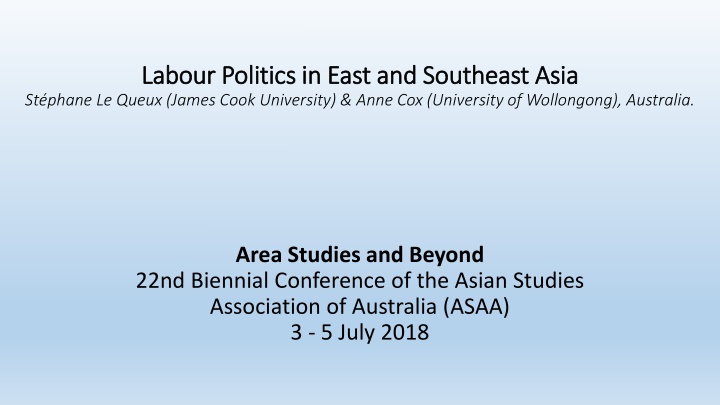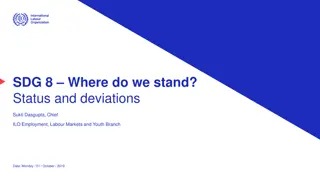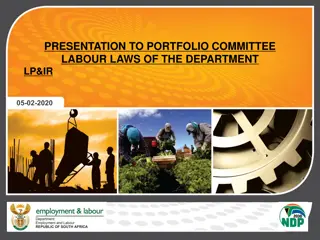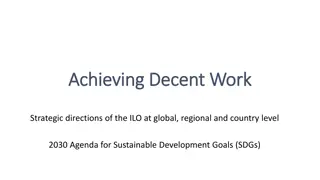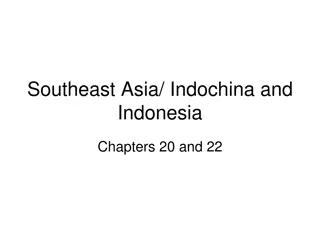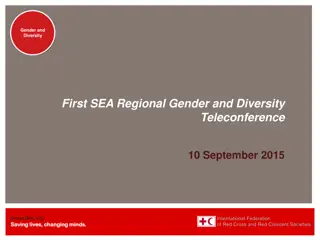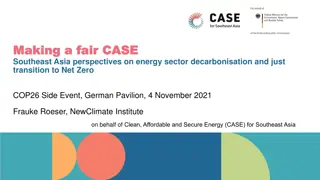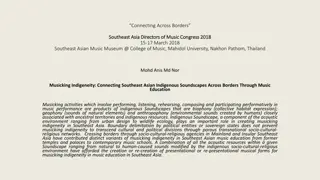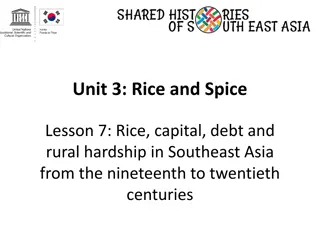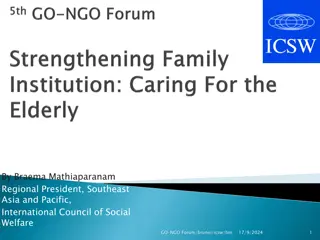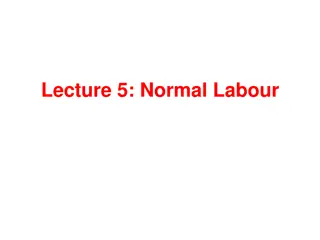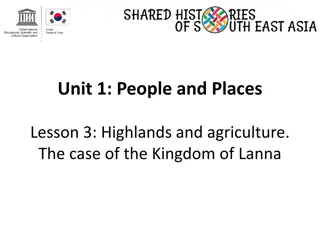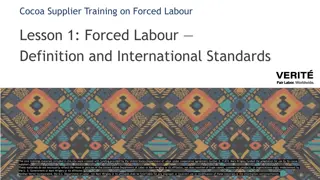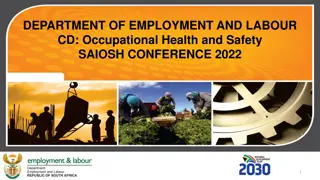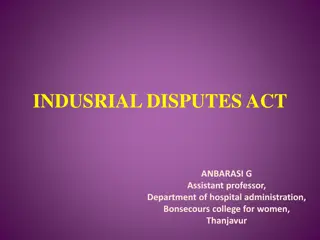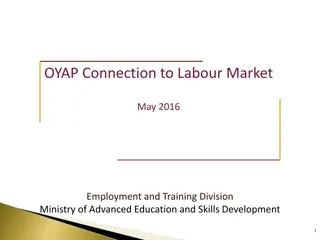Labour Politics in East and Southeast Asia: Key Insights on Decent Work and Industrial Disputes
Contributions from various experts shed light on labour issues in Indonesia, Thailand, Philippines, Singapore, Taiwan, Malaysia, China, and Vietnam. The focus is on decent work, minimum wage fixing, labour exclusion, precarious employment, migrant workers, and industrial disputes, revealing challenges and contradictions in maintaining work standards in low-wage economies.
Download Presentation

Please find below an Image/Link to download the presentation.
The content on the website is provided AS IS for your information and personal use only. It may not be sold, licensed, or shared on other websites without obtaining consent from the author.If you encounter any issues during the download, it is possible that the publisher has removed the file from their server.
You are allowed to download the files provided on this website for personal or commercial use, subject to the condition that they are used lawfully. All files are the property of their respective owners.
The content on the website is provided AS IS for your information and personal use only. It may not be sold, licensed, or shared on other websites without obtaining consent from the author.
E N D
Presentation Transcript
Labour Labour Politics in East and Southeast Asia Politics in East and Southeast Asia St phane Le Queux (James Cook University) & Anne Cox (University of Wollongong), Australia. Area Studies and Beyond 22nd Biennial Conference of the Asian Studies Association of Australia (ASAA) 3 - 5 July 2018
Special issue: Special issue: Regards Chronique Chronique Internationale de Internationale de l IRES Editorial team: Editorial team: No lie No lieDELAHAIE and St phane LE QUEUX DELAHAIE and St phane LE QUEUX http://www.ires.fr/publications/chronique-internationale-de-l-ires/itemlist/category/263-n-156 Regards crois s sur les relations professionnelles en Asie du crois s sur les relations professionnelles en Asie du Sud l IRES (Paris), No 156, December 2016 (published (Paris), No 156, December 2016 (published July 2017). Sud- -Est , July 2017). Est ,
Overview Contributions on Indonesia (minimum wage fixing) and Thailand (labour exclusion) touch upon decent work in low-wage economies; the one on the Philippines exposes the rise of precarious employment. Contribution on Singapore examines tripartite policies directed to the Singaporean core workforce and the one on Taiwan explains ideological factors underlying rising claims for distributive justice. The latter two address the challenges and contradictions of maintaining a productivity agenda under corporatist regimes. Contribution on Malaysia reports the fate of migrant workers at the edge of modern slavery . Contributions on China and Vietnam (including a comparative analysis) focus on the nature and modality of industrial disputes and how these come to challenge established Communist labour institutions, with special attention given to wildcat strikes, particularly in Vietnam.
Reining in Indonesias Trade Reining in Indonesia s Trade Unions (University of Minnesota) and Michele Ford (Sydney University) Depoliticizing minimum wage-setting Joko Widodo (Jokowi) s newly elected administration (2014 ) introduced a new Government Regulation No.78/2015 on Wage Determination. Like Law No.13/2003 on Manpower, this regulation recognised the role of minimum wages in achieving a decent standard of living for all workers. Where it differs from previous practice is in the decentring of tripartite deliberations. Instead, increases are to be determined by merely applying a new formula that set the percentage increase in the minimum wage as equal to the sum of the percentage increase in Gross Domestic Product and the inflation rate. Unions, by Teri L. Caraway
Reining in Indonesias Trade Reining in Indonesia s Trade Unions (University of Minnesota) and Michele Ford (Sydney University) Structural damage to trade union power Unions, by Teri L. Caraway This new mechanism could potentially deliver higher rates of pay to workers than the old system in districts with no strong trade union presence. But the new law robs trade unions of the ability to use their mobilizational capacity to pressure local governments to support their demands for substantial increases in core industrial areas, where they are strongest. The annual wage negotiations provided a focus for local trade union activities, but also an incentive to work with other trade unions and an opportunity to experiment with different mobilizational tactics. Quite apart from the regulation s potential impact on minimum wage levels, then, it is set to have devastating consequences for trade unions capacity to sustain the mobilizational momentum that has been crucial in labour victories in local and national politics in recent years. Since this mobilizational capacity constitutes trade unions greatest weapon, a loss of momentum has implications not only within the local context, but also for their power in the national industrial and political arenas .
Labour Labour Dilemmas in Dilemmas in Thailand (University of New England) The nature and timing of Thailand s capitalist transition, associated class relations, and historically dominant configurations of political power have combined to create an especially difficult structural terrain for attempts to build and sustain independent and effective workplace-based trade unionism. In response to these circumstances, labour activism has taken forms other than trade unionism and been directed toward the spaces of civil society in the shape of a broader social movement politics. Nonetheless, this has not produced any fundamental shift in effective levels of engagement with the formal systems of participatory and representative arrangements, which remain the preserve of coalitions of elites. Indeed, over the last five years some of the leading sectors of organized labour have actually found themselves in alliance with coalitions of elite conservative interests that emerged to rescue their state from the threats posed to it by Thaksin Shinawatra and his supporters. This entanglement with conservative politics has sparked new tensions and contradictions within the labour movement that remain largely unresolved . Thailand, by Andrew Brown
Labour Labour Dilemmas in Dilemmas in Thailand (University of New England) Those working in the country s large, and largely unprotected, informal sector as well as the millions of migrants that are now employed to do the dirtiest and most dangerous work clearly represent segments of the working class where organising campaigns are desperately needed ( ) Closer to home, unions might also look to the growth and evolution, as well as the assistance, of the Red Shirt movement which, for all its contradictions and heterogeneity in terms of its leadership and membership, embodies popular appeals for justice, dignity, participation and a more equitable distribution of the fruits of capitalist development goals to which the state-sanctioned organized labour movement in Thailand has long aspired . Thailand, by Andrew Brown
REGULATING REGULATING NON COUNTRIES: THE ROLE OF LABOUR REGULATIONS AND TRADE COUNTRIES: THE ROLE OF LABOUR REGULATIONS AND TRADE UNIONS by Melisa R. Serrano (University of the Philippines) NON- -STANDARD EMPLOYMENT IN THE PHILIPPINES AND SELECTED ASEAN STANDARD EMPLOYMENT IN THE PHILIPPINES AND SELECTED ASEAN UNIONS, Clearly, there is an expansion and diversification of non-standard employment in the Philippines. This has become a challenge to the legal framework in the country. In response to the increasing diversification and incidence of non- standard employment in recent years, a tightening of legal regulation on the use of non-standard employment, particularly agency-hired work, has been observed. This is consistent with the recent finding of the ILO (2015) as noted in its newly-released World Employment and Social Outlook. In Philippines, regulations on the allowable duration and permitted circumstances for fixed- term contracts and agency-work have been strengthened. The same holds true in Indonesia. In Thailand, equal treatment rules between regular workers and subcontracted workers doing the same or similar jobs have likewise found their way in recent labour law amendments .
REGULATING REGULATING NON ASEAN COUNTRIES: THE ROLE OF LABOUR REGULATIONS AND TRADE ASEAN COUNTRIES: THE ROLE OF LABOUR REGULATIONS AND TRADE UNIONS by Melisa R. Serrano (University of the Philippines) Aware of the limitations of regulatory frameworks, trade unions in the Philippines and other ASEAN countries have been at the forefront of organizing many of the various categories of non-standard workers. Some have also been innovating new representation models and schemes, although unions have yet to extend their mantle of protection to other non-standard workers, particularly those that are enmeshed in a triangular employment relationship. Finally, some trade unions in the Philippines, as in other ASEAN countries, have been initiating or trying to influence legislative and policy initiatives aimed at according more protection to non-standard workers and arresting the spread of non-standard employment in their countries. The variety of strategies used by trade unions in various arenas of engagement indeed highlight that non- standard employment is a multi-faceted issue requiring a multi-dimensional strategic approach to effectively address it . NON- -STANDARD EMPLOYMENT IN THE PHILIPPINES AND SELECTED STANDARD EMPLOYMENT IN THE PHILIPPINES AND SELECTED UNIONS,
Seeking Seeking a Balance between Efficiency and Equity: a Balance between Efficiency and Equity: Politics of Industrial Relations in Taiwan s Political Politics of Industrial Relations in Taiwan s Political Campaign by PAN Shihwei (Chinese Culture University) Seeking economic efficiency in the global marketplace has always been a prioritized goal of Taiwan ( ) The old formula which had been based on low-cost and low-wage production strategy connected with the global supply chain is in trouble ( ) This was exactly the story-told in the 2016 Presidential election in Taiwan . Although the 2016 election gave an impression that people in Taiwan have become interested in the issue regarding equality and other progressive agenda, the reality of the outcome of the election showed that the relationship between Taiwan and Mainland China still matters the most in Taiwan because of China s impact on Taiwan s economy and democracy . Campaign,
Ultra Ultra- -Corporatism and the Singaporean Core Corporatism and the Singaporean Core , by Adrian T.H. Adrian T.H. Kuah Kuah, , St phane St phane Le (James Cook University) (James Cook University) In the absence of natural resources, the availability of skilled labour and its level of productivity have been central to the industrialisation of the city- state and commonly viewed as one of the keys to Singapore s economic success . While maintaining (labour) productivity growth is identified by Singapore s tripartite institutions to be a national priority as the country climbs further up the global value chain, it is primarily directed at the Singaporean core workforce . There is indeed a socio-demographic component underlying the economic imperative. Social pressures are mounting over the dramatic increase in the ratio of migrant workers to Singaporean workers. Tightening the labour market is therefore perceived as a means to persuade employers to extract the best from their human resources, and reduce their dependence on foreign skilled manpower . Le Queux and Queux and Suhaimy Suhaimy Hassan Hassan
Ultra Ultra- -Corporatism and the Singaporean Core Corporatism and the Singaporean Core , by Adrian T.H. Adrian T.H. Kuah Kuah, , St phane St phane Le (James Cook University) (James Cook University) The success of the new agenda still need to be assessed over time. The agenda is full of challenges. First, because Singapore aims to become a regional talent hub, authorities want to reassure international investors that they will not be restricted from access to the human resource competencies they need. In spite of upskilling, a critical issue is whether or not the Singaporean core workforce, and especially its young graduates, are competitive with global talents. Second, in a dual labour market, a challenge is how to manage the only partially incorporated migrant workers for social cohesion and industrial order . Le Queux and Queux and Suhaimy Suhaimy Hassan Hassan
Industrial Industrial Relations and the Case of Temporary Migrant Workers Relations and the Case of Temporary Migrant Workers in in Malaysia, Malaysia, by Vicki Crinis (University of Wollongong) The International Labour Organisation (ILO) has reimagined the role of the national tripartite industrial relations system in shaping decent work with safe and secure working environments for all workers including migrant workers, women and those in precarious employment. Malaysia has an industrial relations tripartite system in place but has failed to represent the interests of local workers let alone temporary labour migrants. Migrant workers in Malaysia are utilised as a niche labour force in the manufacturing, construction, plantation and service sectors. They are employed on short term contracts, dismissed when there is no demand for low-paid workers and subjected to unscrupulous recruitment agents charging interest rates leading to human trafficking conditions. Under the Labour Chapter in the Trans-Pacific Partnership Agreement (TPPA) the government is forced to address issues around migrant workers and human trafficking .
Industrial Industrial Relations and the Case of Temporary Migrant Workers Relations and the Case of Temporary Migrant Workers in in Malaysia, Malaysia, by Vicki Crinis (University of Wollongong) The conditions set out in the TPPA labour chapter allowed for amendments to the labour laws to permit migrant workers to join industry sector unions, but few migrant workers are members of trade unions. The notion that migrant workers can fight for their labour rights through the national tripartite system is not a reality more like a dream in Malaysia. On a more positive note, trade unions are moving to support migrant worker associations under the guidance of a transnational labour movement which they consider more suited to migrant workers . It is highly unlikely that the state will willingly or have the power to enforce labour rights in particular in regards to migrant workers. In fact, as long as the government addresses human trafficking and remains on Tier 2 of the TIP Report there appears to be little pressure on the government to enforce employers to abide by the changes. Employers continue to depend on migrant workers for industries such as the electronics and palm oil and refuse to relinquish their position on workers right to collective bargaining. Many of the transnational industries demand non-unionised workforce because they are flexible low paid workers. For this very reason, the MTUC urged the government not to sign the TPPA, claiming it would be detrimental to the well-being of the 11.8 million Malaysian workers. Workers would be at the losing end as big corporations' priority was dividends for shareholders .
Vietnam (1) Trade Unions in Transition: The Vietnam General Trade Unions in Transition: The Vietnam General Confederation of Labour in the political and economic system in Confederation of Labour in the political and economic system in Vietnam, by Erwin Schweisshelm (Friedrich-Ebert-Stiftung, Vietnam Office) and Do Quynh Chi (Research Center for Employment Relations, Hanoi) The economic reform and especially the rise of informal labour activism have put increasing pressure on the VGCL to transform back to a real union organization . But there are still fundamental obstacles to a transformation into a genuine trade union: First, the VGCL s affiliation to and reliance on the party-state in terms of finance, authority, personnel, and planning. VGCL is facing a dilemma: if it chooses to become truly representative of its members, it must become independent of the Party, which also means the let-go of all the benefits and authority it is enjoying; on the other hand, if it wishes to retain its political power, it can hardly become a real union organisation. Second, the whole system of the VGCL is not adapted to the new approach to focusing on representing members rather than implementing the Party s directives. The resistance of the local VGCL branches to the bottom-up organising approach is the evidence of the mismatch between the traditional and new approaches . Vietnam,
Vietnam (1) Trade Unions in Transition: The Vietnam General Trade Unions in Transition: The Vietnam General Confederation of Labour in the political and economic system in Confederation of Labour in the political and economic system in Vietnam, by Erwin Schweisshelm (Friedrich-Ebert-Stiftung, Vietnam Office) and Do Quynh Chi (Research Center for Employment Relations, Hanoi) The Vietnam Government s commitments to labour reform in the TPP constitute a major pressure on the VGCL to reform. The prospects of non-VGCL unions to be established at enterprise, industrial and regional level have urged the VGCL leadership to speed up their internal reform, starting with the autonomy of the union in terms of personnel and planning . The changes from within in combination with external pressure will probably change the institutional framework for trade unionism in Vietnam. But it probably will not lead to a significant political change as it happened in Poland with Solidarnoc. The CPV has little reason to oppose the TPP s labour regulations which are supposed to protect workers rights and welfare in the first place. But the Party will most likely ensure that any labour union established will only serve economic purposes, i.e. to protect workers rights and economic welfare and not turn into a political organization. The Party and its security apparatus will find a way to legally constrain independent unions within certain boundaries, and to prevent them from being exploited politically . However, reforming the union is at least currently a perceivable trend and together with the political reform, the trade union system will probably move into a direction that allows for the involvement of labour NGOs, independent labour activists and independent enterprise unions . Vietnam,
Vietnam (2) THE DEMISE OF OFFICIAL TRADE UNIONS AND THE RISE OF UNOFFICIAL THE DEMISE OF OFFICIAL TRADE UNIONS AND THE RISE OF UNOFFICIAL WORKER REPRESENTATIVES IN THE GARMENT & TEXTILE INDUSTRY IN WORKER REPRESENTATIVES IN THE GARMENT & TEXTILE INDUSTRY IN VIETNAM, by Anne N. Cox (University of Wollongong) The transformation of Vietnamese trade unions, intended by the Labour Code and by Trade Union Laws and a series of related regulations, has had very limited results. At the present, trade unions structure and operations are full of unsolved dilemmas. At the workplace level, the race to the bottom within the textile and garment industry has led to certain violations of labour rights, especially low salary, benefits and bonuses, long working hours ( ) The formation of unofficial labour action led by unofficial worker representatives , who bypass trade union leaders and have gained significant power to gather thousands of workers on instantaneous strikes, marking a shift from rights-based disputes to interest- based disputes in Vietnam . VIETNAM,
Vietnam (2) THE DEMISE OF OFFICIAL TRADE UNIONS AND THE RISE OF UNOFFICIAL THE DEMISE OF OFFICIAL TRADE UNIONS AND THE RISE OF UNOFFICIAL WORKER REPRESENTATIVES IN THE GARMENT & TEXTILE INDUSTRY IN WORKER REPRESENTATIVES IN THE GARMENT & TEXTILE INDUSTRY IN VIETNAM, by Anne N. Cox (University of Wollongong) ( ) unofficial strike organisers have established strong informal networks with other unofficial employee groups, and have become increasingly sophisticated and coordinated in organising spontaneous strikes on a mass scale. Unofficial strike organisers has gained public support, and wildcat strikes deemed as being the most effective mechanism for workers to have their voices heard . Findings underline the importance of involving workers and their representatives in the process of change and transition (...) persistent grassroots pressure for the transformation of the IR system, which has to date, largely facilitated the exploitation of workers by foreign firms within labour-intensive industries . VIETNAM,
Comparative note on China and Vietnam Comparative note on China and Vietnam, by Fang Lee Cooke (Monash University) and Anne N. Cox (University of Wollongong) It is clear that Chinese and Vietnamese trade unions do not conform to the Western liberal-democratic model of unionism as they are not independent representatives of collective employee interests. There is evidence that governments have attempted transforming trade unions by granting them some autonomy from the Communist Party and company management in the case of Vietnam, or say more responsibility to defend labour rights and interests in China (yet short of weapon the right to strike). However, organizational inertia, the ideological legacies of socialism and the government s commitment to maintain labour peace and to attract foreign capital make for a substantial difference between what is written on paper and what happens on the ground .
Comparative note on China and Vietnam Comparative note on China and Vietnam, by Fang Lee Cooke (Monash University) and Anne N. Cox (University of Wollongong) At the workplace level, trade unions still play a supporting role rather than an independent role in relation to management. Their roles largely continue to be the same as those in the centrally- planned economy period. The exercising of collective bargaining at the workplace level is constrained significantly due to the governmentally centralized floor of rights . The Chinese labour law, by omission, effectively places the issue of strikes in a state of limbo: neither legalizing nor criminalizing it The right to strike is legalised in Vietnam. On the surface, it appears that though starting from similar bases before reforms, the VGCL has been successful in gaining greater autonomy form the Party and government than has its Chinese counterpart. However, in reality the right to strike in Vietnam is severely limited by legal terms and conditions for that to happen .
Comparative note on China and Vietnam Comparative note on China and Vietnam, by Fang Lee Cooke (Monash University) and Anne N. Cox (University of Wollongong) Wildcat strikes are inevitable in this context. Strikes in foreign invested sector are now seen as a very effective way to gain management and the upper-level trade union s attention and achieve quick solutions to workers problems. While informal worker representatives do not secure legal status, unofficial labour activism is an important force driving industrial reform and forcing employers to improve working condition and adopt new initiatives. Strikes have centred on wage concerns, followed by a large number of complaints surrounding the inhumane treatment of workers ranging from extensive working hours to shocking accounts of verbal and physical abuse. Yet right-based industrial disputes still remain more prevalent than interest- based disputes. Evidence also suggests that there are more strikes in labour intensive foreign owned companies with low profit margins and a high volume of production.
General Observations General Observations The interface between industrial democracy and economic development remains a useful heuristic for understanding the labour problem in the region (Deyo 1981; Leggett 1999). States play a dominant role in the pacification of industrial relations, with capital accumulation being the primary motive (Ford and Gillan 2016). International pressures and social clauses in trade agreement yield some advance, but commitment to the enforcement of workers rights remains problematic. Working conditions are largely poor across the region and except for incorporated labour institutions, as in Singapore, organised labour is on the retreat, although less so in Indonesia. the cases of China and Vietnam suggest that rapid industrialisation, intense social change and ineffective formal trade unions leads to the formation of unofficial worker representatives who fight for employee rights and fuel claims for distributive justice as in Taiwan. Observations tend to suggest that beyond the ambiguities of organised labour, militancy is essential to democratization and vice-versa.
References Deyo, F. C. (1981) Dependent Development and Industrial Order: An Asian Case Study, New York: Praeger. Ford, M., Gillan M. (2016) Employment relations and the state in Southeast Asia , Journal of Industrial Relations, Vol. 58, No.2, p. 167-182. Leggett, C. (1999) Hong Kong in context: employment relations in East Asia , Hong Kong Management and Labour, Fosh P. and al. (eds), Routledge Advances in Asia-Pacific Business, London and New York, p. 289-308. Contact: stephane.lequeux@jcu.edu.au
